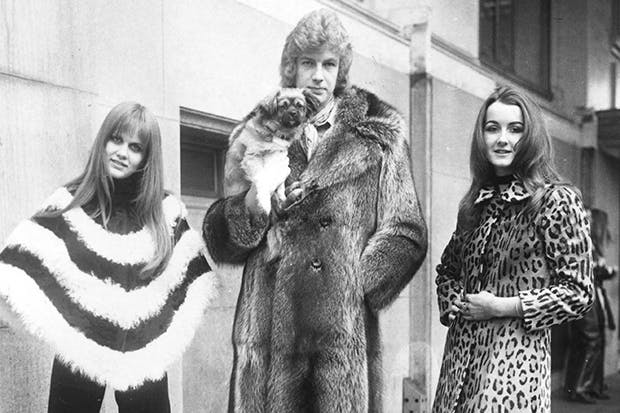The 1960s were already more than halfway over when I realised that I was living through what was supposed to be an exciting decade. I had got married, found a job, had two babies and was leading the stressful life of a young family man, quite unaware that all around me Britain was bubbling with excitement. In 1966 I was in Paris, doing night shifts as a trainee journalist for Reuters news agency, when I happened upon a cover of Time magazine, emblazoned with girls in miniskirts and boys in flared trousers, announcing that London was ‘the swinging city’. When I came home to check this out, London seemed much the same as it had been in the 1950s — a grey and grimy but dignified city, old ladies still wheeling their wicker shopping baskets up and down the Brompton Road. At one point during the Sixties, I had gone to a Beatles concert in Bournemouth, but I hadn’t enjoyed it. Despite an ear-splitting sound system, the fab four were drowned out by the hysterical screams of the girls in the audience, and the noise was unbearable. If this was ‘swinging’, it wasn’t for me.
Then the other day I got an invitation to the 21st birthday party of the beautiful Emily Beatty, the daughter of friends and neighbours in Northamptonshire. I accepted, of course, but noted with concern that the theme of the party was to be the 1970s and that we were to dress in the style of the period. I thought about the Seventies, but couldn’t remember anything special or glamorous about them. They seemed rather a grim decade to me. I returned in 1973 from Rome, where I had been for Reuters for the previous five years, to find Ted Heath at war with the coalminers. He imposed a three-day week as an energy-saving measure and then in 1974 called an election on ‘Who governs Britain’ which decided that the miners did. The decade in my mind is a blur of wars, coups and crises of various kinds, of recession, stagflation and industrial unrest, culminating in the ‘Winter of Discontent’ when rubbish littered the streets and bodies remained unburied.
It was a time marked by the arrival of colour television and Monty Python’s Flying Circus, but also by the pre-eminence of such ghastly people as Gary Glitter, Jimmy Savile and Rolf Harris, all since identified as child abusers. For me the best thing about the Seventies was that in 1975 I was made editor of this magazine, at the same time that Margaret Thatcher became leader of the Conservative party. But The Spectator then was hardly cool or swinging. I usually went to work in a suit and tie, and nobody else in the office wore anything that could inspire me in my choice of get-up for the fancy-dress party. I suppose we were on the fogeyish side, almost untouched by the popular culture of the time. And insofar as I was aware of popular fashion, I saw it as a hangover from the Sixties, without any clear identity of its own. So I decided, being in my own seventies, to go just as I was then and still am now, only without the tie.
The party was in the open air in the middle of beautiful Salcey Forest, with dancing to live music in an enormous barn, and what an eye-opener it was! The Seventies, it turned out, had been a very glamorous decade, and I had missed it entirely. But it wasn’t too late to catch up. The girls, especially the birthday girl, looked terrific in cat suits, miniskirts and hippie dresses, with lots of sequins and bare backs and floral chiffon scarves. They mostly wore platform heels and had their hair layered and feathery in the style of Farrah Fawcett-Majors of Charlie’s Angels. The men were generally a little less appealing, with their unbuttoned shirts and medallions hanging over their hairy chests, several also with wigs and false moustaches or sideburns. The great exception, however, was the host, Nicholas Beatty, Emily’s father, a large and handsome man, who looked magnificent, dressed from head to toe in a voluminous suit of tiger-print material and wearing a hat of the same stuff. He could have been a grand Hollywood impresario, or perhaps an American boxing promoter.
And thus we danced the night joyfully away to the thumping rhythm of The Trojans, a band which, according to its website, specialises ‘in ska and reggae with a dash of soul, funk, R&B and world roots’, whatever those may be. Who knows what the Seventies were all about? But they must have been great fun for those who were there.
Got something to add? Join the discussion and comment below.
Get 10 issues for just $10
Subscribe to The Spectator Australia today for the next 10 magazine issues, plus full online access, for just $10.













Comments
Don't miss out
Join the conversation with other Spectator Australia readers. Subscribe to leave a comment.
SUBSCRIBEAlready a subscriber? Log in